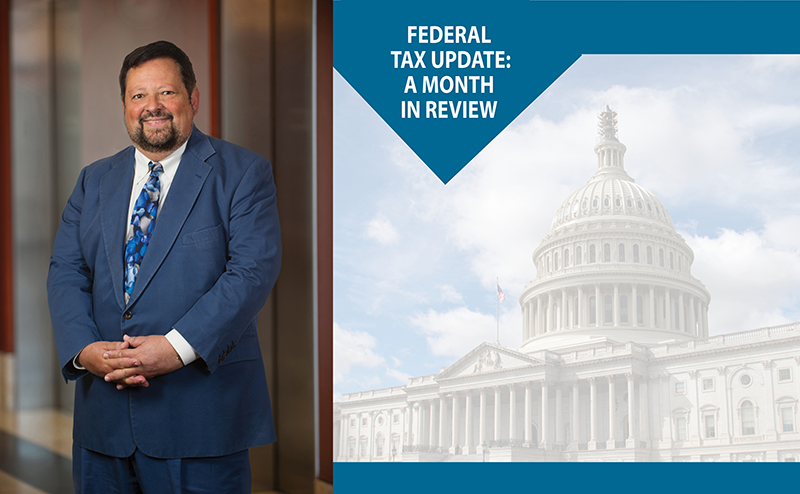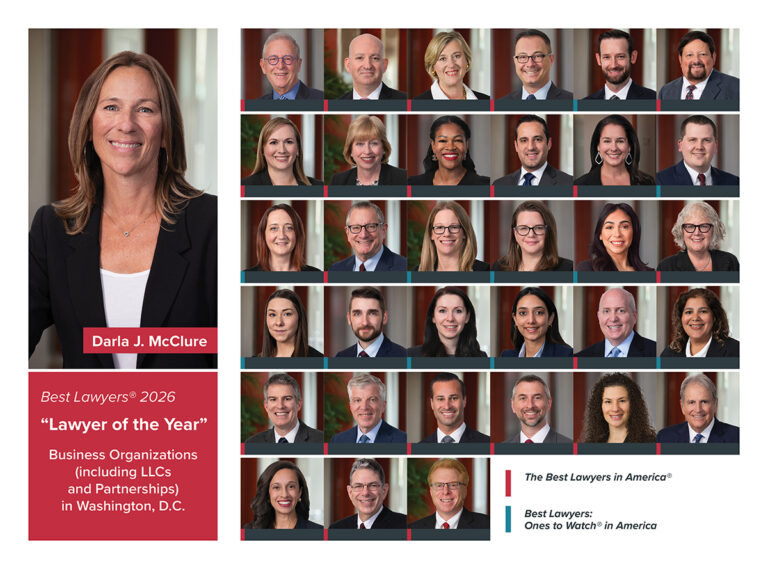September 1st, 2022
Federal Tax Update
Posted in: Tax Law Tagged: David S. De Jong
Author: David S. De Jong

INDIVIDUALS
Public Law 117-169, the Inflation Reduction Act of 2022:
● Extended the limitation on ordinary business losses by individuals through 2028.
● Extended the health insurance premium credit through 2025 with modifications.
● Effective 2023, created an annual rather than a lifetime limitation on the residential energy credit with a yearly cap of $1,200.
● Effective 2023, increased the tax credit for purchasing new all-electric vehicles to $7,500 and created a credit for the first purchaser of a used all-electric vehicle to $4,000 (can be claimed only once in three years and not by a dependent).
In Dern v. Commissioner, TC Memo 2022-90, the Tax Court concluded that damages paid to a sales representative who was terminated because he could not make in-person calls following a heart attack were taxable as the payment was not for physical injury but was for emotional distress and otherwise as set forth in the Complaint as no physical injury arose or was worsened by the Company’s conduct.
In Murphy v. Commissioner, 130 AFTR2d 2022-________, the Tenth Circuit Court of Appeals agreed with the Tax Court that the taxability of an individual’s social security is unaffected by an employer’s reduction in disability benefits tied to the social security received.
In Sylvester v. United States, 130 AFTR2d 2022-5361, a Georgia Federal District Court determined that a veteran’s pension from the Department of Defense is taxable despite VA benefits being nontaxable.
In Domdom v. Commissioner, TC Summary Opinion 2022-17, the Tax Court denied an income earned abroad exclusion to an individual working in Iraq in a “walled compound” where he leased out his California home and his former spouse and children lived in his Nevada home, the Court noting that his abode remained in the United States where he kept his car and bank accounts, making him ineligible for the exclusion.
In Sarma v. Commissioner, 130 AFTR2d 2022-________, the Eleventh Circuit Court of Appeals agreed with the Tax Court that a $77 million capital loss was artificial and not deductible when the taxpayer used multiple tiers of partnerships in an effort to offset capital gain.
In Redleaf v. Commissioner, 130 AFTR2d 2022-5339, the Eighth Circuit Court of Appeals agreed with the Tax Court that pre-2019 payments by an individual to a former spouse were a property settlement and not deductible alimony as they did not necessarily stop upon the recipient’s death under state law and, in any event, the agreement stated that the payee waived spousal maintenance.
In Glade Creek Partner, LLC v. Commissioner, 130 AFTR2d 2022-________, the Eleventh Circuit Court of Appeals upheld the valuation accepted by the Tax Court on a conservation easement after remanding the case to the Tax Court when it threw out an IRS regulation denying any deduction where the full increase in the fair market value of the easement property attributable to post-easement improvements in the event of extinguishment belonged to the donor; in Sparta Pink Properties, LLC v. Commissioner, TC Memo 2022-88, the Tax Court, bound by the earlier Eleventh Circuit decision upheld the pro-IRS valuation despite ignoring the regulation.
In Butterfield v. Commissioner, TC Summary Opinion 2022-16, the Tax Court determined that a construction superintendent who traveled 245 days per year but lost his primary records upon a change in jobs sufficiently proved his pre-2018 expenses by bank records and testimony.
RETIREMENT AND ESTATE PLANNING
In In Re: Gilbert, 130 AFTR2d 2022-________, a New Jersey Bankruptcy Court found that qualified retirement plans enjoy protection from creditors under the law even if there is no anti-alienation provision in the retirement plan.
In Gifford v. Burton, 130 AFTR2d 2022-________, a West Virginia Federal District Court confirmed that an individual could transfer funds from his 401(k) plan to an IRA without spousal consent though she had been the sole beneficiary, inasmuch as the plan only allowed lump sum distributions and not a joint and survivor annuity.
In Grajales v. Commissioner, 130 AFTR2d 2022-________, the Second Circuit Court of Appeals agreed with a New York Federal District Court that the 10 percent penalty for early withdrawal from a retirement plan is not subject to supervisory approval before assessment, concluding that, although called a “penalty”, the 10 percent payment is really a tax and not a penalty.
In Notice 2022-33, IRS extended the date for updating retirement plans and IRAs to reflect provisions of the SECURE and the CARES Acts until December 31, 2025.
BUSINESS
Public Law 117-169, the Inflation Reduction Act of 2022:
● Effective 2023, created a 15 percent minimum tax on the adjusted financial statement income of C corporations with financials showing over $1 billion in average profit over a three-year period (estimated to be 150 companies).
● Created a one percent tax on the fair market value of stock in a public company that is redeemed if the total redemption value is at least $1 million.
● Increased the research and development tax credit that can be claimed by small businesses against payroll taxes to $250,000.
Final Regulations under Code Section 754 eliminate the requirement of signature on a submitted election.
In Eze v. Commissioner, TC Memo 2022-83, the Tax Court denied virtually all business expenses claimed on two schedule Cs, a consulting business and a “construction business” which the Court doubted as to whether it even existed; in the latter “business” the taxpayer claimed losses in excess of $144,000 over two years, the Court noting that mileage records were noncontemporaneous and showed travel of over 8,000 business miles in one month (professional fees were actually the college expenses of the owner’s child and tools were deducted although the owner could not identify their purpose on the witness stand.
In Actavis Laboratories v. United States, 130 AFTR2d 2022-________, the Court of Federal Claims determined that legal expenses paid to defend against patent infringement claims are deductible and need not be capitalized as they do not pertain to facilitating or advancing any FDA approval.
In Bishay v. United States, 130 AFTR2d 2022-________, the Federal Circuit Court of Appeals agreed with the Court of Federal Claims that a suit challenging trust penalty assessment had to be thrown out as the taxpayer paid only $100 to the IRS and not the smallest withholding for any employee for any quarter which was $135.53.
PROCEDURE
Public Law 117-169, the Inflation Reduction Act of 2022, increased the IRS budget by $80 billion over ten years to hire more personnel and to upgrade technology.
In Hancock County Land Acquisitions, LLC v. United States, 130 AFTR2d 2022-________, the Eleventh Circuit Court of Appeals agreed with a Georgia Federal District Court that IRS cannot be enjoined per the Anti-Injunction Act from enforcing the tax assessed on a partnership related to a $180 million deduction for donation of a conservation easement; in Harper v. Commissioner, 130 AFTR2d 2022-________, the First Circuit Court of Appeals reversed a New Hampshire Federal District Court and held that a suit to enjoin IRS from using information obtained from a third party summons regarding cryptocurrency was not barred by the Anti-Injunction Act which the US Supreme Court previously stated does not apply to information gathering but only acts of assessment and collection.
In Barker v. Manhattan Parking Group, 130 AFTR2d 2022-________, a New York Federal District Court held that an individual does not have a private right of action against a former employer for failing to provide a Form W-2.
In Remisofsky v. Commissioner, TC Memo 2022-89, the Tax Court agreed with IRS that a doctor’s alcoholism and depression was insufficient for penalty abatement for late filing and payment as he was able to continue his profession and, in any event, his wife could have gathered the needed information.
In Warner Enterprises Inc. v. Commissioner, TC Memo 2022-85, the Tax Court held that a partner cannot challenge the lack of supervisory approval of a penalty at the individual level as the penalty arose from a unified partnership proceeding and the challenge should have been made at the entity level.
In United States v. Katholos, 130 AFTR2d 2022-________, a New York Federal District Court reiterated that a taxpayer must file an FBAR when the taxpayer has a beneficial interest in a foreign account irrespective of legal title, leaving the issue of willfulness to a subsequent merits trial.
In Jones v. United States, 130 AFTR2d 2022-________, the Court of Federal Claims concurred with IRS that acceptance of the 5 percent streamlined penalty for non-willful failure to file an FBAR return does not bar IRS from a subsequent determination that a taxpayer’s conduct was willful as no closing agreement with IRS was entered into as a result of the streamlining.
In United States v. Taylor, 130 AFTR2d 2022-________, a North Carolina Federal District Court determined that a limited liability company and a trust were both alter egos of a couple when they controlled the accounts and used funds to pay their living expenses as opposed to a debt of over $7 million to the IRS.
In Estate of Lee v. Commissioner, 130 AFTR2d 2022-________, the Third Circuit Court of Appeals agreed with the Tax Court that IRS did not abuse its discretion in rejecting an Offer in Compromise by an estate where it believed the reasonable collection probability was greater than the offered amount.
In In Re: Fernandez, 130 AFTR2d 2022-________, a Florida Bankruptcy Court held that a physician could discharge hundreds of thousands of dollars in tax debt where he was treated as an independent contractor and failed to make estimated taxes, finding that his spending was high but not necessarily excessive or lavish despite numerous overseas trips and expensive jewelry purchased for successive wives.
In Notice 2022-36 and News Release 2022-155, IRS announced that it would not impose the penalty for late filing on 2019 and 2020 Forms 1040, 1041, 1065, 1120 and 1120-S among other returns with certain narrow exceptions provided the applicable return is filed by September 30, 2022 (with a refund being generated to those who have already paid such penalties); IRS will give similar relief in the case of 2019 and 2020 information returns filed by the August 1 following the due date.
In Chief Counsel Memorandum 20223301F, IRS indicated that a preparer penalty should be assessed for advising a client to create an impermissible reserve for bad debt in its receivables as the position was contrary to well-settled law.






